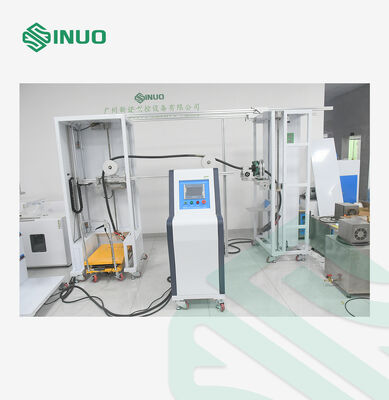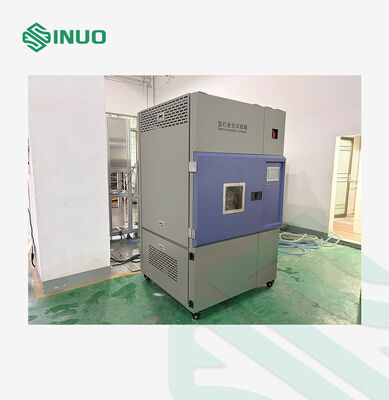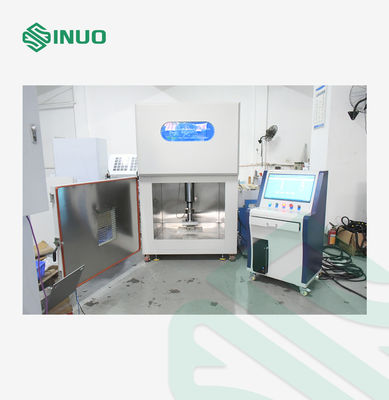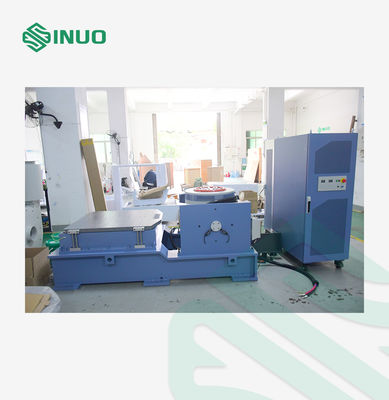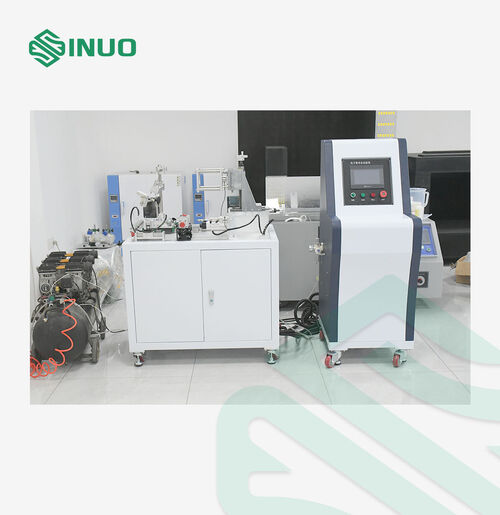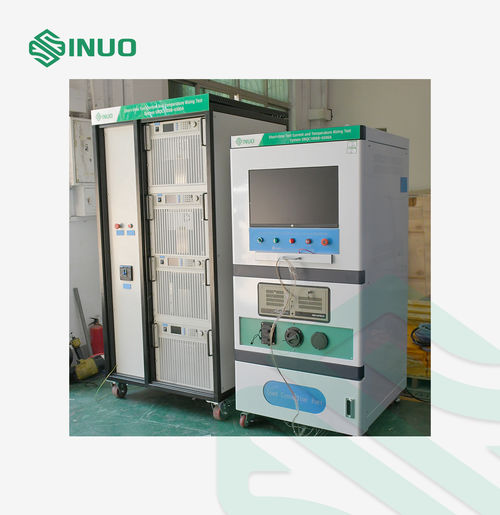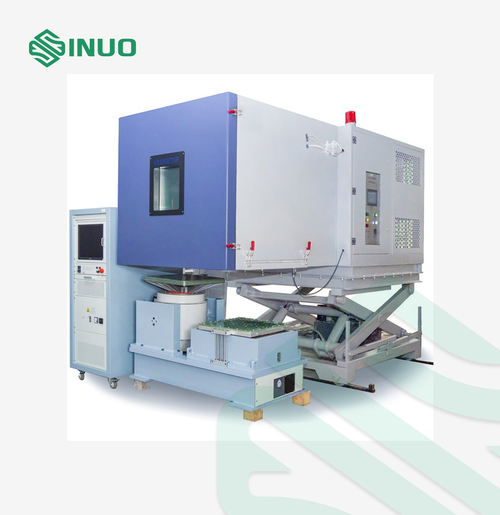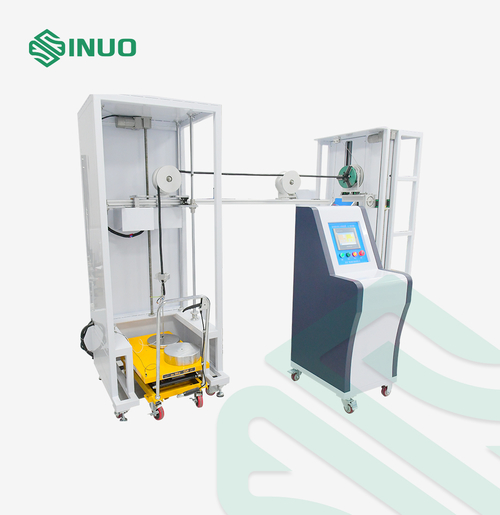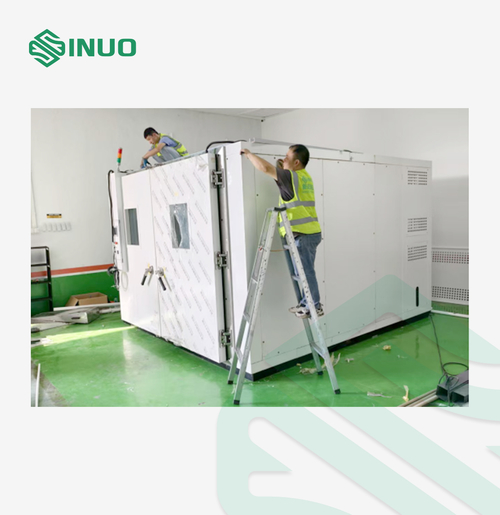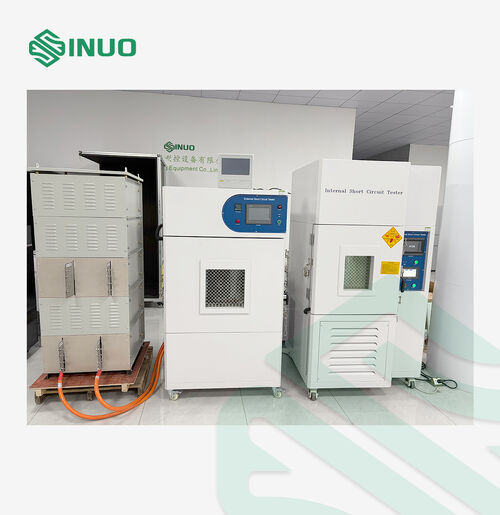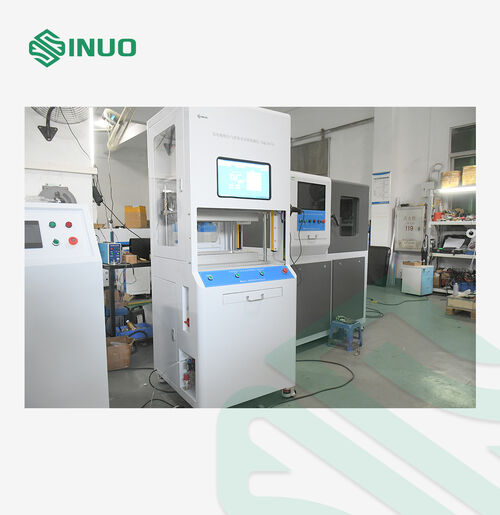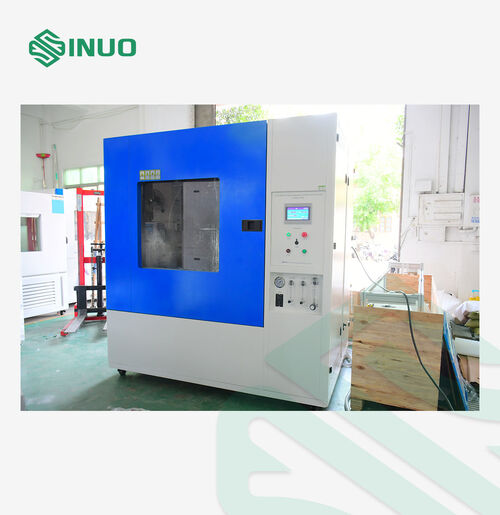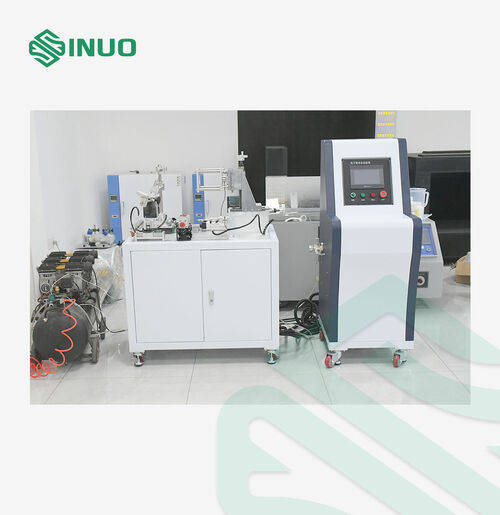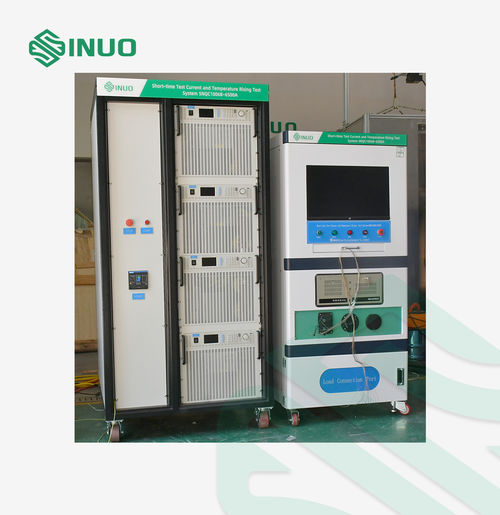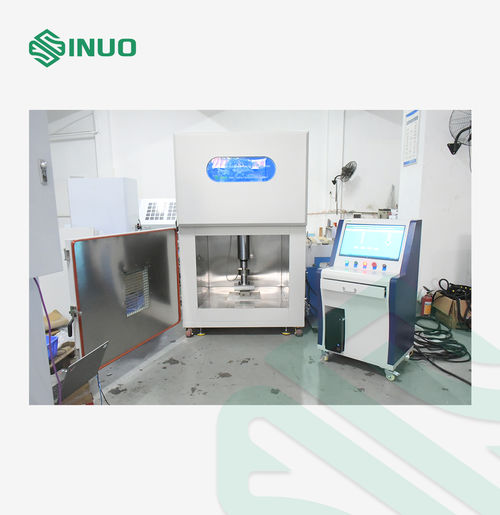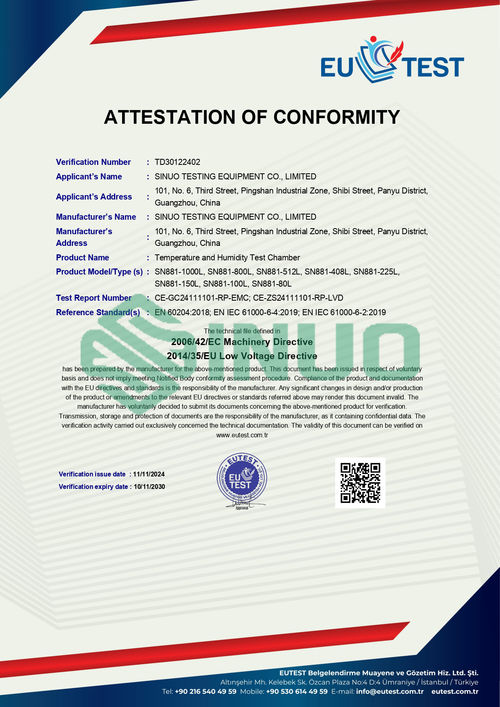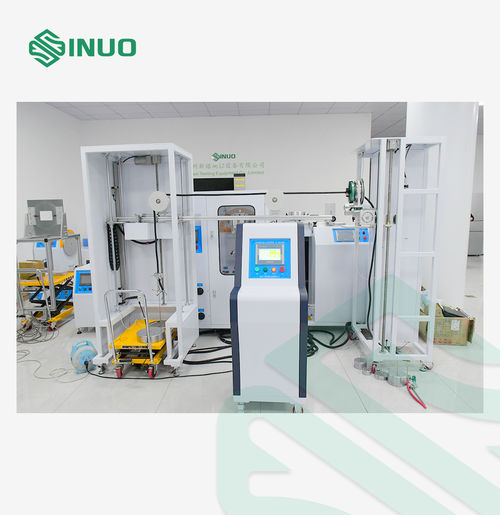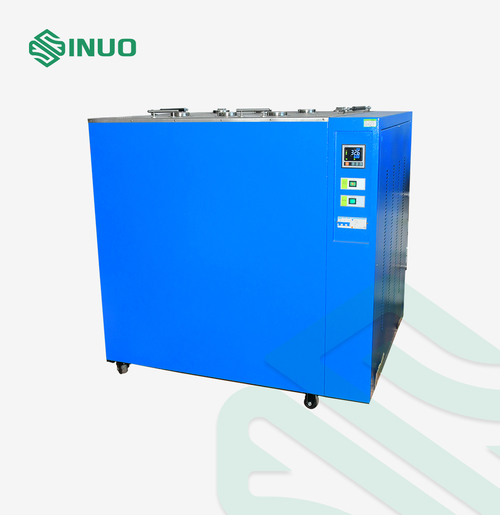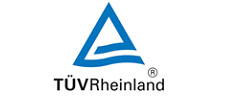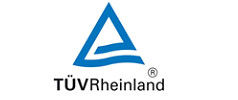As electric vehicles (EVs) continue to reshape the automotive landscape, ensuring the safety and reliability of charging equipment has become a top priority for manufacturers worldwide. In response, Sinuo has unveiled its latest innovation: the Comprehensive Tester for Electronic Locking Devices of EV Charging Guns—a state-of-the-art solution for evaluating electronic and mechanical lock mechanisms used in AC/DC EV charging connectors.
This advanced tester has already attracted attention from leading EV manufacturers, R&D centers, and certification laboratories, thanks to its ability to simulate real-world operating conditions including mechanical stress, electrical load, thermal influence, emergency release, and extreme cycling. By rigorously testing electronic locks, the system ensures that charging interfaces meet GB/T 20234.1-2023, IEC 62196-1:2022, and other international standards.
Key Highlights from the Case:
Simulating Real Operations: The tester accurately replicates normal use, emergency unlocking, and extreme condition cycles, helping engineers identify potential vulnerabilities before products reach the market.
High-Precision Testing: With axial push/pull force control (0–50N, ±0.5% error) and programmable unlocking force up to 100N, the system delivers repeatable, accurate results.
Automated Intelligence: Mitsubishi PLC and 7-inch HMI provide manual or programmable operation, real-time monitoring of lock/unlock signals, and comprehensive recording for traceability.
Durable and Versatile: The device supports up to 99,999 cycles, independent mechanical modules for climate chamber integration, and universal fixtures compatible with GB, EU, and US AC/DC connectors.
Safety and Reliability: Built-in grounding, overload, and short-circuit protection safeguard both operators and equipment.
In one recent application, a leading EV component manufacturer used the tester to simulate extreme operating conditions, uncovering subtle weaknesses in their locking mechanism. With Sinuo’s advanced solution, engineers were able to optimize design, improve reliability, and confidently demonstrate compliance with global standards.
“Sinuo’s EV Charging Gun Electronic Lock Tester is a game-changer for the industry. It allows us to evaluate every critical aspect of the locking device with precision and repeatability,” said a senior R&D engineer. “And the ability to customize testing solutions to our unique requirements makes it even more valuable.”
Looking Ahead:
Sinuo continues to lead the way in EV testing technology. The company accepts all kinds of customized solutions, helping manufacturers, laboratories, and R&D centers create safer, more reliable, and globally compliant EV charging devices.
Customer Background
With the rapid growth of the electric vehicle (EV) industry, one of our international clients — a leading EV connector manufacturer — required a reliable testing solution to verify the temperature rise and short-time current withstand performance of their charging plugs and sockets according to IEC 62196-1 and related standards.
They were seeking a system that could deliver high accuracy, intelligent control, and stable long-term performance under heavy current load conditions.
Sinuo Solution
To meet these requirements, Sinuo provided the SNQC1006B-6500A, a high-performance Short-time Test Current and Temperature Rising Test System, developed specifically for EV plug and socket testing.
The system integrates automatic temperature control, real-time monitoring, and smart data processing, ensuring precise test results and full compliance with international standards.
Key Features & Advantages
High Current Output
Adjustable DC 200–6500A test current
Stable output with fast response (within 1 second)
Suitable for short-time high current and temperature rise tests
16-Channel Temperature Monitoring
High-accuracy temperature measurement (±0.3% + 1°C)
Supports multiple thermocouple types (K, T, E, J, etc.)
Automatic ambient temperature compensation
Intelligent Control System
Integrated industrial touchscreen computer
PLC-based programmable operation
Real-time display of temperature, current, and curve data
Automatic data recording and export (CSV/XLSX formats)
Multiple Operation Modes
Continuous Mode
On/Off Mode
Automatic Temperature Control Mode
Compliance
Fully meets IEC 62196-1 Ed.4CDV 2020, IEC 62916-2, and IEC 62916-3 standards — ideal for EV connector, charging interface, and electrical accessory testing.
Testing Applications
EV plug and socket temperature rise test
Contact resistance and voltage drop measurement
Grounding contact short-time withstand current test
Product quality inspection and R&D verification
Customer Benefits
Reduced test time through automation and smart current control
Improved accuracy and repeatability of temperature rise measurements
Fully traceable data for product certification and quality audits
Stable, safe, and efficient operation for long-term use
Result
After implementation, the client successfully conducted complete temperature rise and short-time current tests with precise and repeatable results.
This allowed them to accelerate product certification and improve testing efficiency, ensuring all EV connectors met IEC waterproof and current endurance standards before shipment.
Sinuo Testing Equipment Co., Limited is a trusted provider of advanced environmental and reliability testing solutions. With a strong focus on compliance to international standards, Sinuo designs equipment for automotive parts, aerospace, aviation, petroleum, chemical, electronics, and communications industries, helping global clients validate the durability and safety of their products.
The Challenge
In industries such as aerospace, electronics, and automotive, components are often subjected to harsh and combined environmental stresses—temperature fluctuations, humidity changes, and mechanical vibrations. Traditional single-condition testing does not fully simulate real-life working environments, creating a need for comprehensive, multi-environment testing solutions.
The Solution
To address this need, Sinuo developed a combined solution:
Electromagnetic Vibration Testing Machine (SN553-EV322HG120VT120.GP.VCS-2)
Provides sinusoidal vibration stress per IEC 60068-2-6.
Accurately simulates mechanical fatigue, resonance, and transportation effects.
Adjustable frequency and amplitude for various testing conditions.
Temperature, Humidity and Vibration Three Comprehensive Test Chamber (SN888-7200B-CT)
Creates controlled environments of cold (IEC 60068-2-1), dry heat (IEC 60068-2-2), and damp heat (IEC 60068-2-30 / -78).
Capable of simultaneous or sequential application of temperature, humidity, and vibration stresses.
Enables full reliability and adaptability evaluation under combined conditions.
Standards Compliance
This integrated system strictly complies with:
IEC 60068-2-6:1995 Environmental testing for electric and electronic products-Part 2: Test methods Test Fc: Vibration (sinusoidal)
IEC 60068-2-1:2007 Environmental testing for electric and electric products-Part 2-1: Tests-Test A: Cold, IDT
IEC60068-2-2: 2007 Environmental Testing-Part 2-1:Tests- Test B-Dry heat, IDT
IEC60068-2-30:2005 Environmental Testing-Part 2-30:Tests-Test Db.: Damp heat, cyclic(12h+12h cycle),IDT
IEC60068-2-78:2001 Environmental Testing-Part 2-78:Tests-Test Cab: Damp heat, steady
state, IDT
Application Scenario
Client Background:
A automotive component manufacturer needed to verify that their automotive component could withstand combined stresses of launch vibrations and extreme space temperature variations.
Implementation:
The component was first mounted in the vibration system to simulate take-off vibrations.
Simultaneously, the comprehensive test chamber introduced cycles of high heat, extreme cold, and damp humidity.
Test results measured real-time changes in electrical performance, physical integrity, and adaptive reliability.
Outcome:
The client identified weak points in the automotive component, redesigned them, and successfully passed certification testing. This reduced risks of in-orbit failure and improved customer trust.
Benefits to Clients
Client Type
Benefits
Aerospace Manufacturers
Simulates launch & space environment in one chamber.
Electronics Producers
Ensures long-term stability of devices under thermal + mechanical stress.
Automotive/EV Industry
Tests vibration, heat, and humidity effects for vehicle electronics.
Research Institutions
Provides flexible testing capabilities for scientific validation.
Why Choose This System?
Comprehensive Testing: Integrates temperature, humidity, and vibration in one system.
Global Standards Ready: Fully compliant with IEC environmental and vibration test methods.
High Accuracy & Control: Precise simulation of real-world multi-stress conditions.
Versatile Applications: From satellites to consumer electronics, adaptable for multiple industries.
Conclusion
The Electromagnetic Vibration Testing Machine + Three Comprehensive Test Chamber is a powerful solution for companies seeking to replicate real-world environmental stresses and verify the reliability and adaptability of their products. It helps manufacturers stay compliant, reduce product failures, and accelerate global certification.
Case Study | EV Charging Station Pull & Torque Testing Equipment
Project Overview
In response to the growing demand for safe and reliable EV charging stations, our team developed an advanced Pull & Torque Testing Equipment for AC and DC charging stations. Designed according to IEC 61851-23:2023 clause 11.6.102, this solution helps clients ensure their charging products meet international safety standards.
Tested Samples
Electric vehicle AC and DC charging stations
Cord anchorage and cable fixing devices of charging guns
Testing Goals
The flexible cord anchorage must relieve conductors at terminals from pulling force and torque. This equipment accurately tests the ability of cord anchorage and cable fixing mechanisms to withstand specified tensile forces and torque, guaranteeing long-term product safety and reliability.
Testing Principle
Pulling Force: Applied via a motor-driven eccentric wheel with adjustable speed, ensuring precise and repeatable force. Duration is monitored automatically.
Torque: Applied using a motor-driven tray lifting a weight, which automatically resets after the test duration.
Key Features
PLC-controlled automated operation for ease of use
Stable pulling force via weight system; torque generated through weights and torque arm
Customizable number of cycles and torque test duration; equipment stops automatically
Compatible with charging guns of different cable lengths
Ensures maximum displacement of connector cables stays within standard limits
Client Benefits
Improved product testing efficiency and reliability
Supports R&D and production quality control
Ensures compliance with IEC standards for international markets
We provide customized solutions to meet diverse testing requirements and continuously innovate to help our clients stay ahead in the EV industry. Contact us today for inquiries!
A leading automotive supplier required a reliable environmental test solution to evaluate the performance and durability of various components—such as wiring harnesses, control modules, sensors, and dashboard parts—under extreme temperature and humidity conditions.
Their goal was to simulate real-world climate exposure such as hot summers, cold winters, and high-humidity tropical environments to ensure the long-term reliability and regulatory compliance of their parts.
The walk-in environmental chamber is a large-scale testing device designed to simulate extreme temperature and humidity conditions. It features a temperature range of -40°C to +120°C (customizable) and a humidity range of 20% to 98% RH. The chamber is used for conducting high and low temperature as well as humidity tests.These parameters are suitable for simulating a wide range of environmental conditions, from extreme cold to high heat, and from dry to highly humid climates. The equipment adopts phased temperature control technology, enabling rapid heating and cooling during the test process. The temperature change rate can be adjusted according to experimental requirements, ensuring that the test conditions accurately reflect real operating environments such as day–night temperature differences and regional climate variations in transportation applications.
The walk-in environmental chamber is primarily designed for the field of transportation engineering, with applications including:
Automotive component testing: Verifying the reliability of automotive electronic parts, battery packs, sealing elements, and other components under extreme temperature and humidity conditions.
Material durability evaluation: Assessing the aging performance of materials such as rubber and plastics when subjected to long-term high and low temperature cycles.
Complete system environmental adaptability tests: Simulating special climatic conditions such as desert heat and arctic cold to evaluate the operational stability of construction machinery and rail transit equipment.
With its large chamber design, the equipment can accommodate entire systems or oversized components for comprehensive high and low temperature as well as humidity testing.
Wide-range Environmental Simulation: Covers a temperature range of -40°C to 120°C and a humidity range of 20% to 98% RH, meeting the requirements of most extreme environmental tests.
Precise Control: Utilizes PID regulation algorithms to achieve temperature stability within ±0.5°C and humidity stability within ±2% RH.
Safety Protection: Equipped with over-temperature protection, leakage monitoring, and emergency power-off devices to ensure safe operation during long-term testing.
Modular Design: Can be customized to expand test space or integrate additional modules such as vibration tables according to user requirements.
Operating Procedure for the Walk-in Environmental Chamber:
Pre-clean the test chamber: Ensure the chamber is free of residues to prevent interference with test results.
Set target temperature, humidity, and ramp rates: Avoid rapid changes that may damage the equipment.
Monitor and record data in real time: Track any abnormal fluctuations, and perform a gradual return-to-ambient temperature procedure after testing.
Maintenance Requirements:
Periodically calibrate sensors.
Replace filters regularly to ensure optimal performance and accuracy.
The vibration test machine simulates the various environments products face during manufacturing, assembly, transportation, and usage to determine their ability to withstand vibrations. It is suitable for industries like electronics, electromechanics, optoelectronics, automotive, toys, and more, helping with research, development, quality control, and manufacturing.
Vibration Test Bench Features:
Operating Temperature: 5°C to 35°C
Environmental Humidity: Not exceeding 85% RH
Electronic Control: Adjustable vibration frequency and amplitude with strong driving power and low noise.
High Efficiency: Supports high load, wide frequency range, and low failure rates.
User-Friendly Controller: Easy to operate, fully enclosed, ensuring safety.
Efficient Vibration Patterns.
Mobile Work Frame: Easy to place, aesthetically pleasing, and convenient.
Ideal for Production Lines: Perfect for full inspections in production or assembly lines.
Purpose of Vibration Testing:
Vibration testing is used to simulate the various environmental conditions products may encounter during manufacturing, assembly, transportation, and usage, assessing their ability to withstand vibration and ensuring product durability and reliability.
Product Type: Vertical and Horizontal Vibration Test System
1. Product Name:
Electric Vibration Test Machine with Vertical Expansion Table
2. Product Description:
The electric vibration test machine with a vertical expansion table is designed to accommodate test samples or fixtures that exceed the size of the standard electric vibration table’s moving coil surface. To address this, an additional auxiliary table (expansion table) is installed. This allows for larger or customized test setups during vibration tests. In cases where specialized fixtures are required for the test samples, customized fixtures can be designed to meet specific testing needs.
3. Product Features:
Precision Engineering: The table is carefully designed and calculated, ensuring a sturdy structure, uniform surface, and an aesthetic appearance.
Scientific Design: The table offers a high upper frequency limit and easy installation for efficient setup.
Versatility: Available in a variety of standard specifications, with the option for customized solutions based on customer requirements.
High-Quality Materials: Constructed using magnesium-aluminum alloy or magnesium alloy gravity casting, ensuring durability and strength.
The horizontal vibration table is a key component that enables three-directional vibration testing using an electric vibration system. It is available in integrated (unified) and separate (split) designs, with the integrated design offering enhanced rigidity and easier installation.
The system consists of a horizontal table surface, V-shaped guide rails, connectors, a granite base plate, a horizontal table base, and a built-in hydrostatic oil source.
The size and thickness of the table directly affect the mass of the moving system and the upper frequency limit. The specifications listed below represent standard configurations, but customized options can be discussed based on specific testing requirements.
When integrated with a vibration system, this setup enables two-dimensional and three-dimensional vibration testing for components and assemblies in industries such as aerospace, aviation, marine, automotive, and electronics. Additionally, when paired with a temperature and humidity test chamber, it forms a comprehensive environmental testing system.
Product Features
High Performance: Achieves higher acceleration and working frequency with a lightweight moving system, improving load capacity and overall efficiency.
Integrated Design: The unified structure ensures high rigidity, making installation and calibration easy.
Precision Guidance: Uses V-shaped guide rails for smooth movement, strong anti-tilt properties, and excellent off-center load resistance.
Durable Construction: Features a granite base plate combined with a low-pressure oil film system, offering high load-bearing capacity, superior compression strength, and exceptional wear resistance.
Reinforced Structure: The welded and reinforced table body provides excellent counteracting mass and damping effects, ensuring stable and accurate test results.
Built-in Vibration Isolation System: Reduces ground vibration transmission, preventing interference between different test setups and improving overall testing accuracy.
Walk-In Temperature and Humidity Environmental Chamber: Features, Applications, and Selection Guide
The walk-in temperature and humidity environmental chamber is designed for testing entire systems or large components under various conditions such as low temperature, high temperature, temperature fluctuations, constant heat, and alternating damp heat. Also known as a "constant temperature and humidity room," it can be customized in size and functionality based on user requirements. Its modular design, sleek appearance, and advanced airflow system make it adaptable to diverse testing needs. Equipped with a touchscreen and PLC controller, this chamber is a high-tech solution for precise environmental simulation.
This article explores the working principles, application fields, technical features, key selection criteria, and specifications of the walk-in temperature and humidity chamber, offering readers a comprehensive understanding of this sophisticated product.
1. Working Principle
The chamber integrates advanced cooling, heating, humidifying, dehumidifying, and air circulation systems to achieve precise temperature and humidity control. Its interior uses multi-layer insulation and high-efficiency heat exchangers to ensure a stable and uniform environment. The control system, powered by a microprocessor or PLC and high-precision sensors, continuously monitors and adjusts environmental parameters in real-time to maintain preset values with exceptional stability during extended operations.
2. Application Fields
The walk-in chamber is widely used in industries requiring environmental simulation, including:
Aerospace: Testing the performance of materials and electronic components under varying temperature and humidity conditions.
Automotive Electronics: Simulating extreme climatic conditions to assess the durability and reliability of automotive parts.
Biomedical and Pharmaceuticals: Ensuring product stability and safety under controlled environmental conditions.
Food Preservation and Agriculture: Studying storage conditions and agricultural research.
Construction Materials Testing: Evaluating the durability and performance of building materials under different environmental factors.
3. Technical Features
Large Capacity Design: With a spacious interior, the chamber can accommodate multiple samples or large equipment, significantly enhancing testing efficiency.
High-Precision Control: Advanced algorithms and sensors ensure precise temperature and humidity control to meet high-accuracy testing requirements.
Multi-Stage Programming: Supports multi-segment programming, allowing users to preset multiple test phases for fully automated testing workflows.
Safety Features: Equipped with multiple safety mechanisms, including over-temperature protection, power failure memory, and leakage protection, ensuring reliable and secure operation.
Eco-Friendly and Energy Efficient: Incorporates high-efficiency cooling and heating components with energy-saving designs, reducing power consumption and aligning with modern environmental standards.
4. Key Selection Criteria
When selecting a walk-in temperature and humidity chamber, consider the following factors:
Testing Requirements: Define your testing goals, sample types and sizes, and required environmental conditions to choose the appropriate model and specifications.
Control Precision: Ensure the chamber meets the accuracy levels required for your tests.
Brand and After-Sales Support: Opt for a reputable brand to guarantee product quality and reliable after-sales service.
Cost-Effectiveness: Balance the purchase price, operating costs, and long-term benefits to select a product with the best value.
5. Technical parameters
Capacity
Inner chamber size (W*H*D)
Temperature range
Specification/Model
8m³
2000*2000*2000 (mm)
-40 °C ~+150°C
SN886-8-(-40 °C)
-50 ℃~+120℃
SN886-8-(-50 °C)
-60 °C ~+150°C
SN886-8-(-60 °C)
-70 °C ~+150°C
SN886-8-(-70 °C)
16m³
4000*2000*2000
(mm)
-40 °C ~+150°C
SN886-16-(-40 °C)
-50 ℃~+120℃
SN886-16-(-50 °C)
-60 °C ~+150°C
SN886-16-(-60 °C)
-70 °C ~+150°C
SN886-16-(-70 °C)
24m³
4000*2000*3000
(mm)
-40 °C ~+150°C
SN886-24-(-40 °C)
-50 ℃~+120℃
SN886-24-(-50 °C)
-60 °C ~+150°C
SN886-24-(-60 °C)
-70 °C ~+150°C
SN886-24-(-70 °C)
30m³
5000*2000*3000
(mm)
-40 °C ~+150°C
SN886-30-(-40 °C)
-50 ℃~+120℃
SN886-30-(-50 °C)
-60 °C ~+150°C
SN886-30-(-60 °C)
-70 °C ~+150°C
SN886-30-(-70 °C)
1. Sample limitation
This test chamber prohibits:
Testing or storage of flammable, explosive, and volatile substance samples
Testing or storage of samples of corrosive substances
Testing or storage of biological samples
Testing or storage of strong electromagnetic emission source samples
Testing or storage of radioactive material samples
Test or storage of highly toxic substance samples
Testing or storage of samples that may produce flammable, explosive, volatile, highly toxic, corrosive and radioactive materials during testing or storage
2. Volume, size and weight
2.1 Nominal content volume
6M³
2.2 Inner chamber size
D(2000)mm ×W(1500)mm× H(2000)mm
2.3 External dimensions
Approx. D(3750)mm ×W(2120)mm× H(2450)mm
2.4 Weight
Approx. 1500KG
3. Performance
3.1 Temperature range
Temperature range:-50 ℃~+120℃
3.2 Humidity range
(20 ~ 98)% RH (refer to temperature and humidity controllable range chart, no active wet and heat load)
Temperature and humidity controllable range chart
3.3 Temperature fluctuation
≤±0.5℃ (The temperature fluctuation is half of the difference between the measured maximum temperature and the minimum temperature at the center point)
3.4 Temperature uniformity
±2.0℃ (Temperature uniformity is the arithmetic mean of the difference between the highest and lowest temperature measured in each test)
3.5 Temperature error
±2.0℃
3.6 Heating time
+20℃~+120℃≤45min (Non-linear no-load)
3.7 Cooling time
+30℃~-50℃≤75min (Non-linear no-load)
3.8 Relative humidity error
(Damp heat only)
±3%RH
3.9 Working noise
Sound level≤75dB
(Measured in a soundproof room with an ambient temperature of 25 ° C and low echo; using A weighting, the average value of 8 points is tested; each test point is 1 meter away from the noise source and 1 meter away from the ground)
4. Structural characteristics
4.1 Material
1. Outer wall material: Cold rolled steel plate, pickling and phosphating advanced powder baking paint
2.Inner wall material: SUS304# stainless steel plate
3. Chamber insulation material: rigid polyurethane foam + glass fiber
4.2 Air duct parts
Centrifugal fan; the air outlet can adjust the air volume, height and return air volume
4.3 Door
Double open hinged door, adopts reaction-free grip handle, equipped with observation window, lighting lamp, window/door frame anti-condensation electric heating device, door opening size: (approximately) 1.5*2M
4.4 Observation window
There are two conductive film explosion-proof tempered glass observation windows on the door (with anti-condensation function) 500W×600H (mm)
4.5 Fan
Long axis centrifugal fan
4.6 Sample rack
Two built-in stainless steel adjustable movable tray racks
4.7 Impeller
Use stainless steel impeller imported from Taiwan
4.8 Heater
Nickel-chromium alloy electric heater
4.9 Refrigeration Compressor
Germany Bitzer compressor
4.10 Evaporator
Fin type evaporator
4.11 Refrigerating method
Mechanical compressor cascade
4.12 Cooling method
Air-cooling
4.13Temperature control instrument
TH1200-A, 7-inch smart LCD touch programmable controller
4.14 Lead hole
Φ100mm, 1pc, equipped with a special foam rubber plug (located on the left side of the chamber)
5. Heating, humidification and refrigeration systems and their working principles
5.1 Heating system
Stainless steel sleeve type anti-dry heating tube built-in nickel-chromium alloy heating wire
U-shaped fin type stainless steel high-speed heating electric heater is used for heating
Completely independent system, does not affect the control circuit
5.2 Humidification system
Humidification method:
1. External detachable boiler humidification method or built-in water tank humidification
2. Stainless steel armored humidifier
3. Humidifier control mode: non-contact and other periodic pulse width adjustment, SSR (solid state relay)
4. Water level control device, humidifier anti-dry burning device, sediment collection device, liquid level observation window
5. Humidifier power: 12KW
Humidification system
Humidifier:
1. Fully automatic water supply device or button type electric automatic water replenishment
2. High and low temperature double water level electronic level switch to prevent malfunction
3. Water shortage and air burning over temperature protection + ultra-low water level protection + water supply overtime protection to ensure the safe operation of equipment
5.3 Refrigeration system
Cooling method: air-cooling
Refrigeration compressor: Germany Bitzer compressor with environmentally friendly refrigerant
Refrigerant copper tube: inner spiral K-TYPE refrigerant copper tube
Condenser: wave-shaped fin type air-cooled condenser
Evaporator: Slope type FIN—TUBE evaporator
Freezing element: Original imported solenoid valve, drying filter, etc.
5.4 Features
The pipelines of the whole system are subjected to a 22kg leak detection test
The heating and cooling system is completely independent
The system can prevent high temperature and high pressure air flow back
All refrigeration system action programs are completely controlled by the microcomputer controller
At Sinuo Testing Equipment Co., Limited, we offer state-of-the-art walk-in environmental chambers that cater to a wide range of testing needs, from temperature and humidity simulations to complex, customized environments. While we provide a variety of standard models, we understand that every client’s requirements are unique. That’s why we specialize in crafting bespoke solutions, tailored precisely to your specifications.
Whether you're in aerospace, automotive, electronics, or other industries, our flexible designs ensure that your testing conditions are met with the highest accuracy and reliability.
Looking for something beyond the ordinary? Let’s discuss how we can create the perfect testing environment for your business. Contact us today to unlock custom solutions that drive your success!
Essential Equipment and Testing Procedures for Battery Cell Safety
Ensuring the safety and reliability of battery cells is critical, especially for new energy applications. Below, we delve into the must-have equipment and standardized testing steps designed to guarantee battery performance and safety:
Battery Cell Thermal Abuse Test Chamber
This chamber simulates high-temperature conditions based on international standards like UL1642 and IEC62133. By gradually increasing the temperature, it evaluates the cell’s stability under extreme heat to ensure no fire or explosion occurs.
Battery Cell Short Circuit Test Chamber
Equipped with PLC automated controls, this device simulates external short circuits. It measures voltage, current, and surface temperature changes to assess the battery's safety performance under short-circuit conditions.
Battery Low-Pressure Test Chamber
Designed to mimic high-altitude, low-pressure environments, this chamber tests battery stability under reduced pressure, ensuring no safety hazards arise.
Battery Crush Tester
Simulating scenarios like waste disposal compression, this device evaluates how batteries withstand pressure without causing external short circuits, ensuring their safety in real-world situations.
Battery Nail Penetration Tester
By driving a steel nail through the battery cell, this test simulates internal short circuits, ensuring the cell remains stable without igniting or cracking during internal failures.
Battery Impact Tester
This equipment applies varying levels of force and impact angles to test the battery’s resistance to shocks, ensuring it won't catch fire or explode after a collision.
Battery Drop Tester
Featuring an automated structure, this machine simulates free-fall scenarios. It allows adjustments for drop height and force, verifying the battery’s safety and integrity after impact
Battery Cell Fire Resistance Chamber
This chamber evaluates the battery’s behavior in fire conditions. It ensures the battery doesn’t penetrate the aluminum mesh during flame exposure, meeting stringent safety standards.
Each rigorous testing step provides a solid foundation for ensuring the safety of new energy vehicle batteries. These state-of-the-art devices and well-defined procedures are key to delivering top-tier battery quality and building consumer trust.
At Sinuo Testing Equipment Co., Limited, we specialize in providing a comprehensive range of cutting-edge testing equipment and tailored solutions for new energy battery cells. Our advanced systems are designed to meet international safety and performance standards, ensuring reliable and accurate results for every application.
Whether you need equipment for thermal abuse, short circuit, drop tests, or custom testing scenarios, we’ve got you covered. Partner with us for innovative, high-quality solutions that guarantee the safety and reliability of your battery products.
We welcome inquiries from all interested clients and are ready to assist you in finding the perfect testing solution. Contact us today to take your battery testing to the next level!
The IP code or ingress protection code indicates how well a device is protected against water and dust. It is defined by the International Electrotechnical Commission (IEC) under the international standard IEC 60529[1] which classifies and provides a guideline to the degree of protection provided by mechanical casings and electrical enclosures against intrusion, dust, accidental contact, and water. It is published in the European Union by the European Committee for Electrotechnical Standardization (CENELEC) as EN 60529.
1. Purpose of Testing
The primary objective of IP dustproof and waterproof testing is to ensure that products can effectively prevent the intrusion of dust and water during use. This guarantees their proper functioning and extends their service life. Test results hold significant value for product design, manufacturing, quality control, and market promotion.
2. Testing Standards
IP dustproof and waterproof tests typically adhere to standards set by the International Electrotechnical Commission (IEC), such as IEC 60529 (updated to IEC 60529:2013 or later versions). These standards categorize dustproof and waterproof performance into different levels, evaluated through specific testing methods and conditions to assess a product’s protection capability.
3. First digit: Solid particle protection
The first digit indicates the level of protection the enclosure provides against access to hazardous parts (e.g., electrical conductors, moving parts) and the ingress of solid foreign objects, ranging from IP0X (no dust protection) to IP6X (complete dust protection). Common testing methods include:
Dust Chamber Testing: The device is placed in a dust chamber where dry dust particles are dispersed to simulate real-world environmental conditions. Standards such as IEC 60529 are followed.
Dust Blowing Testing: Using equipment that generates air-blown dust, this test simulates exposure to dusty environments with strong winds. Standards like IEC 60068-2-68 may apply.
4. Second digit: Liquid ingress protection
The waterproof level is represented by the second "X" in IPXX, ranging from IPX0 (no water protection) to IPX8 (protection against long-term immersion under specific conditions defined by the manufacturer). Common testing methods include:
Drip Testing (IPX1 and IPX2):
IPX1: Vertical drip testing simulates water droplets falling vertically onto the product.
IPX2: Tilted drip testing simulates water droplets falling at a 15° angle from vertical.
Rain Testing (IPX3 and IPX4):
IPX3: Spray testing simulates rainfall from various angles.
IPX4: Splash testing simulates water splashing from all directions.
Water Jet Testing (IPX5 and IPX6):
IPX5: Water jet testing simulates exposure to low-pressure water jets.
IPX6: Powerful jet testing simulates exposure to high-pressure water jets.
Immersion Testing (IPX7 and IPX8):
IPX7: Short-term immersion testing typically involves submersion in 1 meter of water for 30 minutes.
IPX8: Long-term or deep-water immersion testing is conducted under specific conditions defined by the manufacturer.
5. Testing Process
The IP dustproof and waterproof testing process generally includes the following steps:
Sample Preparation: Select representative samples of the device to ensure they accurately reflect the entire product line.
Environmental Setup: Configure laboratory conditions such as temperature, humidity, and air pressure per standard requirements to simulate real-world usage scenarios.
Test Procedure Development: Develop a detailed testing plan based on the device’s characteristics and testing needs, including parameters like testing duration, spray angles, and water volume.
Test Execution: Conduct dustproof and waterproof tests as per the plan, documenting the device's performance and relevant parameters.
Analysis and Evaluation: Analyze and evaluate the test results to determine whether the device meets the applicable standards.
Report Preparation: Compile a comprehensive report detailing the testing methods, data, analysis, and conclusions.
Applications of IP Code Testing and Our Offerings Applications:
IP Code testing is widely used across various industries to ensure products meet dustproof and waterproof standards. Key application areas include:
Consumer Electronics: Smartphones, tablets, and other portable devices.
Automotive and Transportation: Car and motorcycle components, such as headlights and sensors.
Household Appliances: Washing machines, refrigerators, and kitchen appliances.
Telecommunications: Outdoor communication equipment and network devices.
Lighting and Signaling: Streetlights, outdoor LED lights, and traffic signal systems.
Our Solutions:
At Sinuo Testing Equipment Co., Limited, we pride ourselves on delivering a full spectrum of cutting-edge IP Code testing equipment and tailored solutions designed to exceed your expectations. From standard-compliant devices to fully customized systems for unique testing needs, we offer precision-engineered solutions that ensure reliability, efficiency, and unparalleled quality.
Partner with us to elevate your testing capabilities and experience innovation at its best!



















